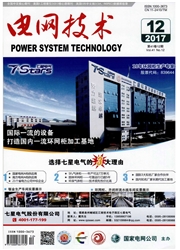

 中文摘要:
中文摘要:
电力电子电路损耗分析一直是行业研究的重点。传统的电路损耗预测方法局限于单个器件,而忽略了其它器件的损耗,以及弱化了器件与器件损耗之间的关系,导致预测方法复杂,精度不够高,为此提出了一种电力电子电路损耗预测建模的方法,它不局限于对单个器件进行损耗分析,而是从电路整体的损耗出发,基于小样本采样,采用智能学习算法支持向量机建立电路的效率模型,利用遗传算法对模型参数进行优化。实验采用了两级式逆变器作为研究对象,搭建了两级式逆变器实验平台,建立了基于遗传优化支持向量机的效率模型,模型预测结果验证了效率模型的有效性和准确性。与传统的损耗预测方法相比,遗传优化支持向量机的效率模型用简单的代数公式代替了复杂的效率计算公式,简化了模型的复杂程度,同时提高了模型的预测精度。
 英文摘要:
英文摘要:
The loss analysis of power electronic circuit has been the focus of the field research. The traditional circuit loss prediction method is limited to individual devices, while ignoring the loss of other devices and weakening the function relation between the device and device's loss, which leads to complex prediction and low accuracy. This paper proposed a modeling method to predict the power electronic circuit loss, which, not restricted to the loss analysis of single device but aimed at the overall circuit loss and based on small sampling,adopted the support vector machine of intelligent learning algorithm to build the circuit efficiency mode and optimized the parameters by using genetic algorithm. Taking the two-level inverter as the research object, it built the twolevel inverter experiment platform, and established the efficiency models of support vector machine based on genetic optimization. The prediction results verified the validity and accuracy of the efficiency model. Compared with the traditional loss prediction methods, the support vector machine efficiency model optimized by genetic algorithm adopts the simple algebraic formula instead of the complex efficiency formula, which simplifies and improves the prediction accuracy of the model.
 同期刊论文项目
同期刊论文项目
 同项目期刊论文
同项目期刊论文
 期刊信息
期刊信息
